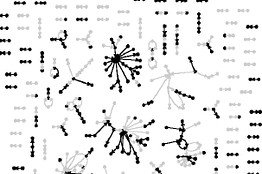Twitter After a Disaster: Is It Reliable?
Wall Street Journal » Blogs » Digits
By Jennifer Valentino-DeVries
Can you trust Twitter in a disaster?
Researchers at Yahoo analyzed tweets after the Chilean earthquake earlier this year and found evidence that the Twitter community works like a “collaborative filter,” questioning reports that turn out to be fake and confirming those that are true.
 Lately the microblogging service has been a source of news after catastrophes such as earthquakes. It’s quick and easy and can be a direct conduit from eyewitnesses to the outside world. But like anything else coming from unsubstantiated sources, news from Twitter faces big questions of credibility.
Lately the microblogging service has been a source of news after catastrophes such as earthquakes. It’s quick and easy and can be a direct conduit from eyewitnesses to the outside world. But like anything else coming from unsubstantiated sources, news from Twitter faces big questions of credibility.
The Yahoo researchers didn’t find anything to suggest that information should be considered reliable because it’s tweeted or re-tweeted. But what they found was that when false rumors entered Twitter, about half of the tweets related to the information denied it.
When the researchers studied tweets about rumors that were later confirmed to be true, they found that less than 1% of tweets about that information denied it. Some tweets questioned the true information, but eventually it became supported, and almost all tweets affirmed it.
In one example, news of a tsunami after the Chilean earthquake on Feb. 27 spread quickly through Twitter “while government authorities ignored its existence,” the authors — Marcelo Mendoza, Barbara Poblete and Carlos Castillo — wrote. That rumor turned out to be true.
News of baseless rumor about a tsunami warning elsewhere in Chile also spread quickly through Twitter, but the vast majority of tweets mentioning it denied or questioned it.
The authors of the Yahoo study suggest that Twitter programs could provide a service to analyze tweets and warn users when a lot of other tweeters are questioning information they are reading. “This would provide signals for users to determine how much to trust a certain piece of information,” they wrote in the paper, which was presented at a social-media analytics workshop in late July.
The paper also takes a look at how information spread through Twitter after the earthquake — who was retweeting whom and how the conversation about the quake changed over time. On the first day, tweets about the earthquake itself and about tsunami warnings dominated. That news was replaced by tweets focused on missing people and requests for help — and then finally about news that the quake might have shifted the Earth’s axis.
Follow Jennifer Valentino-DeVries on Twitter @jenvalentino
Marcelo Mendoza, Barbara Poblete, Carlos Castillo: "Twitter Under Crisis: Can we trust what we RT?". In SOMA 2010: KDD Workshop on Social Media Analytics, Washington, DC. July 2010. [bib|soma]


